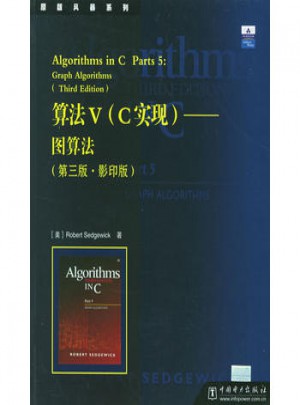

Robert Sedgewick再次给我们提供了重要的流行算法的介绍。这次的重点是图形算法,图形算法在很多应用中已日益重要,诸如网络连接、电路设计、调度、事务处理以及资源分配。本书中,Sedgewick同样用简洁的实现将理论和实践成功地结合了起来,这些实现均可在真实应用上测试,这也正是他的著作多年来倍受程序员欢迎的原因。
本书是Sedgewick彻底修订和重写的丛书中的第二本。及时本(第Ⅰ-Ⅳ部分)介绍了基础、数据结构、排序和搜索。而即将出版的第三本重点在于字符串、几何和一些高级算法。每本书的新增内容都包含了新的算法和实现,改进后的描述和图表,以及用于提高技巧的大量练习。对抽象数据类型所花费的笔墨使得程序在更大范围内有用,也和现代面向对象编程环境更为相关。
本书包括以下内容:
图形属性和类型的完整综述
有向无环图和DAGs
最小生成树
最短路径
网络流程
图表、样例C代码和详细的算法描述
Robert Sedgewick是普林顿大学的计算机科学教授。他是Adobe Systems公司的主管,并曾在施乐的帕洛阿尔托研究中心、美国国防防御分析研究所和法国国立计算机与自动化研究所从事研究工作。他从斯坦福大学获得了博士学位。Sedgewick教授还和Philippe Flajolet合著了《An Introdu
GraphAlgorithms
Chapter17.GraphProperties and Types
17.1 Glossary
17.2 GraphADT
17.3 Adjacency-Matrix Representation
17.4 Adjacency-Lists Representation
17.5 Variations,Extensions,and Costs
17.6 GraphGenerators
17.7 Simple,Euler,and Hamilton Paths
17.8 Graph-Processing Problems
Chapter18.Graph Search
18.1 Exploring a Maze
18.2 Depth-First Search
18.3 Graph-Search ADT Functions
18.4 PropertiesofDFSForests
18.5 DFS Algorithms
18.6 Separability and Biconnectivity
18.7 Breadth-FirstSearch
18.8 GeneralizedGraphSearch
18.9 AnalysisofGraphAlgorithms
Chapter19.Digraphs and DAGs
19.1 Glossary and Rulesof the Game
19.2 Anatomy of DFS in Digraphs
19.3 Reachability and Transitive Closure
19.4 Equivalence Relations and PartialOrders
19.5 DAGs
19.6 Topological Sorting
19.7 Reachability in DAGs
19.8 Strong Components in Digraphs
19.9 TransitiveClosure Revisited
19.10 Perspective
Chapter20.MinimumSpanningTrees
20.1 Representations
20.2 Underlying Principles of MST Algorithms
20.3 Prim's Algorithm and Priority-FirstSearch
20.4 Kruskal's Algorithm
20.5 Boruvka's Algorithm
20.6 Comparisons and Improvements
20.7 Euclidean MST
Chapter21.Shortest Paths
21.1 Underlying Principles
21.2 Dijkstra's algorithm
21.3 All-Pairs Shortest Paths
21.4 Shortest Pathsin Acyclic Networks
21.5 Euclidean Networks
21.6 Reduction
21.7 Negative Weights
21.8 Perspective
Chapter22.Network Flows
22.1 Flow Networks
22.2 Augmenting-Path Maxflow Algorithms
22.3 Preflow-Push Maxflow Algorithms
22.4 Maxflow Reductions
22.5 Mincost Flows
22.6 Network Simplex Algorithm
22.7 Mincost-Flow Reductions
22.8 Perspective
References for Part Five
Index